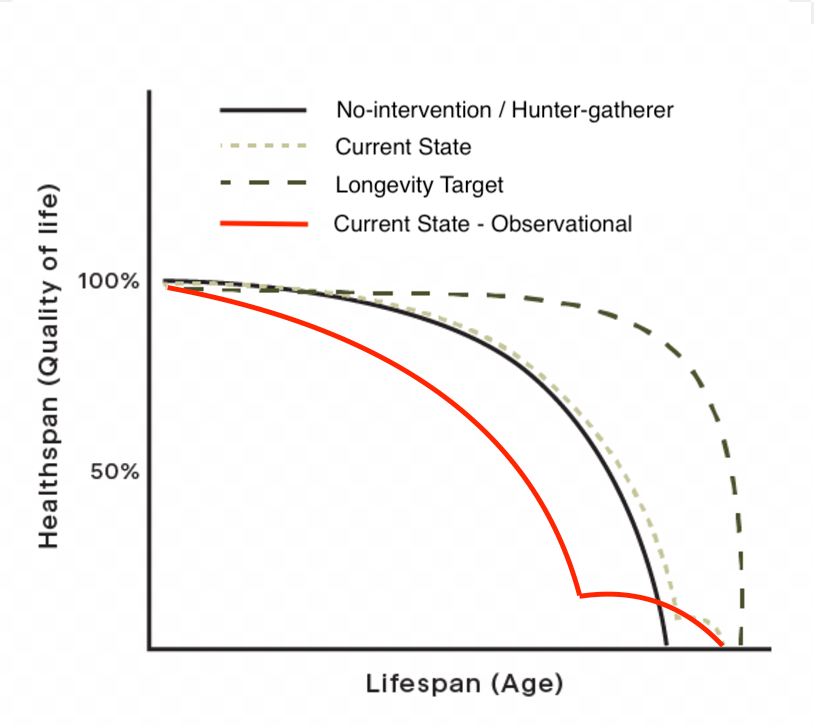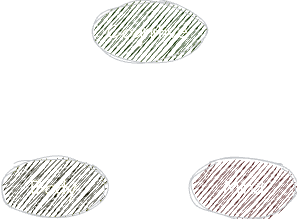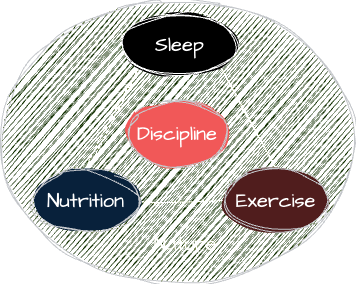Foundations and Pillars of Health
Published on 7th December 2024 by Phil Elson
After a long journey hunting down the root causes of my health issues, I really don't want to go down this road again, for as long as I can. And the passing of my final Grandparent from Dementia makes this even more poignant. I want, need longevity - to live as long as I can while doing the things I love with the people I love.
- Live as long as I can - this is essentially lifespan
- Doing the things I love with the people I love - this is healthspan
So, how do we get there? We'll, here's what I've found:

Longevity is summarised in this graph - as our life continues, we age, and with that, our health naturally deteriorates (the downward curve).
The blackline is no intervention or our hunter-gatherer ancestors (ignoring acute illness and disease) their health falls and they die quickly.
The thin dashed line is where the medical literature puts us at the moment, following the line of our ancestors then like my Nanny the marginal decade of poor health but life.
The red line is what I think we currently face, based on my health issues and experience - It seems to me from the literature and our current health issues that our hunter-gatherer ancestors had better health than we do (Richard B. Lee et al, 2005). We just have more medicine to treat the symptoms of the diseases of our time.
The darker dashed line is what I am aiming for, and you should probably think about aiming for it as well! This also called Compressing Morbity - reducing the time in life where we are suffering from a disease or medical condition.
We're not trying to live forever, or even extend our lives, we just want to live the best life we can with the time that we're given.
The 3 Pillars of Health
Peter Attia breaks health into 3 categories or vectors. I call them pillars, as it implies they hold things up.
These three pillars are, the health of our body, our mental health and our cognitive health.
As I reflect on my grandparents and my Nanny's recent passing I realise that these 3 pillars quite acutely touch home: Dementia took away Nanny's cognition, which then took her body and 2 of my other grandparent's bodies and minds failed them. Only my Grandad really had a healthspan that continued to near the very end - he compressed his morbidity as they say!

How do we support the Pillars?
In order for us to support our health and therefore our mind, cognition and body, we unsurprisingly need strong foundations.
Based on my research there are 3 foundations of health: sleep, nutrition and exercise. Chronic lack of any one will see you in an early grave, arguable exercise is the slowest killer, whereas lack of sleep and nutrition will kill you at about the same time (Dr M Walker, 2018).
I first researched nutrition and applied the lessons and my health improved (All 3 pillars) - in summary: remove processed foods, eat whole foods (nuts, seeds, fruit, vegetables), and no fruit juices, limit alcohol. The research also shows this lowers the risk of Cancer, Metabolic, Neurodegenerative and Heart Disease ((Dr R Lustig, 2021), (Dr D Perlmutter, 2022)).
Second I researched exercise and continue to apply and improve my practice and the research mentioned that exercise also lowers the risk of Cancer, Metabolic, Neurodegenerative and Heart Disease (Dr P Attia, 2023) - the 4 horsemen of aging. We generally think of exercise here as for the body, but exercise of the mind is also critically important for longevity, especially for cognition (J Turknett et al, 2022) and this means exercises like music, dance, language and activities which encourage proprioception, like walking on natural surfaces (not tarmac), playing catch and so on.

Finally, I researched sleep. Luckily my mind told me sleep was important and I've naturally obeyed my body's ebb and flow (in general!) but the literature also states that sleep also lowers the risk of these diseases as well as helps us form new memories, remember facts, be creative and much much more (Dr M Walker, 2018).
I've also found (and the literature supports) that my mind's inner peace, motivation, ability and anxiety have all improved markedly as I integrated each of these foundations into my lifestyle - improving my mental health. For me, fixing my nutrition made the biggest impact at my current age.
All 3 foundations therefore help increase the likelihood of healthspan by supporting the pillars and minimising the risk of the diseases of our time - Cancer, Metabolic, Neurodegenerative and Heart Disease ((Dr P Attia, 2023), (Dr M Walker, 2018), (Dr R Lustig, 2021), (Dr D Perlmutter, 2022)).
Maintaining the foundations
To shape a lifestyle built on these foundations means deploying willpower & discipline - this is the maintenance to stop the foundations and pillars from collapsing - an investment in our future if you will. The good news that I've found is it's hardest at the start. Once I improved my nutrition, willpower & discipline were easier to achieve. My perceptions started to change and my wife has had the same experience - those naughty treats I used to have, I now see as poison making it easier to ignore most of them! We also try not to set ourselves up for failure, by not buying in the things we still crave.
I also mention Nature, and Nature is about remembering that:
- We evolved from our hunter-gather ancestors and that we need to embrace rather than fight the nuances that evolution gifted us with and how it is the reason these 3 foundations are important - for example time outside for sunlight, and setting the circadian rhythm to aid sleep and the cycles of our day, the food we need from nature to nourish our bodies and mind and the movement/exercise we needed to adapt and survive.
- We're all different - shapes, sizes, metabolisms, colours, lives, the list is long. Nature loves variation - it improves the likelihood of survival. So we need to be mindful that being different is great and to listen to our bodies, so we employ these foundations in a way that fits with our nature as individuals in this world.
- We're social creatures, and that those social connections are important not only to our mental health (mind) but also our cognitive health

